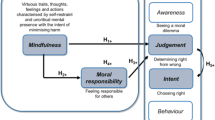Abstract
Kant’s duty of self-knowledge demands that one know one’s heart—the quality of one’s will in relation to duty. Self-knowledge requires that an agent subvert feelings which fuel self-aggrandizing narratives and increase self-conceit; she must adopt the standpoint of the rational agent constrained by the requirements of reason in order to gain information about her moral constitution. This is not I argue, contra Nancy Sherman, in order to assess the moral goodness of her conduct. Insofar as sound moral practice requires moral self-knowledge and moral self-knowledge requires a theoretical commitment to a conception of the moral self, sound moral agency is for Kant crucially tied to theory. Kant plausibly holds that self-knowledge is a protection against moral confusion and self-deception. I conclude that although his account relies too heavily on the awareness of moral law to explain its connection to moral development, it is insightful and important in Kantian ethics.
Similar content being viewed by others
Notes
For a decisive counter argument to Williams’s claim about the role of duty in Kantian moral psychology see Herman (1993).
This raises the issue (which I will not here discuss) of how to reconcile Kant’s earlier a priori “pure” ethics with his later “impure”ethics or practical anthropology. For an extended discussion see Louden (2000).
Cases of sense perceptions of which we are not aware, but whose existence we can infer, are cases of obscure ideas (this form of idea makes, for example, sexual repression possible). Kant notes: “we are often enough the victims of obscure ideas which are reluctant to vanish even when understanding has thrown light upon them. To arrange for his grave in his garden or under a shady tree, in a field or in a dry plot of ground, is often a very important affair to a dying man, even though he knows that if he chooses the one, he has no reason to hope for a nice view; and if he chooses the other, he has no reason to worry about catching a cold.” (2006, AK 7: 136–137).
Moral fanatics base their reason for action on a pathological incentive and produce “a frivolous, high-flown, fantastic cast of mind, flattering themselves with a spontaneous goodness of heart that needs neither spur nor bridle and for which not even a command is necessary and thereby forgetting their obligation, which they ought to think of rather than merit.”
Moran writes: “The rakehell as described seems to attempt a relation to his original shame, which does not involve viewing the world through it (in this case, himself and his actions), but instead treats it as an opaque psychological fact about himself that he has this attitude, a fact from which he can draw certain conclusions—conclusions which in this case conflict with the original attitude itself” p. 188.
References
Ameriks K (2000) Kant’s theory of mind. Oxford University Press, Oxford
Boyle M (2009) Two kinds of self-knowledge. Philos Phenomenol Res LXXVIII(1):133–164
Herman B (1993) Integrity and impartiality. In her The practice of moral judgment. Harvard University Press, Cambridge, pp 23–44
Kant I (1965) Critique of pure reason (trans: Norman Kemp Smith). St. Martin, New York
Kant I (1991) The metaphysics of morals (trans: Mary Gregor). Cambridge University Press, Cambridge
Kant I (1997a) Critique of practical reason (trans: Mary Gregor). Cambridge University Press, Cambridge
Kant I (1997b) Lectures on ethics (trans: Peter Heath). Cambridge University Press, Cambridge
Kant I (1998) Religion within the boundaries of mere reason (trans: Allen Wood and George di Giovanni). Cambridge University Press, Cambridge
Kant I (2006) Anthropology from a pragmatic point of view (trans: Robert B. Louden). Cambridge University Press, Cambridge
Kitcher P (1984) Kant’s real self. In: Wood A (ed) Self and nature in Kant’s philosophy. Cornell University Press, Ithaca, NY
Korsgaard C (1996) The sources of normativity. Cambridge University Press, Cambridge
Louden RB (2000) Kant’s impure ethics: from rational beings to human beings. Oxford University Press, New York
McGeer V (2007) The moral development of first-person authority. Eur J Philos 81–108
Moran R (2001) Authority and estrangement: an essay on self-knowledge. Princeton, Princeton University Press
O’Neill O (1989) Consistency in action. In her Constructions of reason: explorations of Kant’s practical philosophy. Cambridge University Press, Cambridge
Sherman N (1993) Wise maxims/wise judging. The Monist, pp 41–65
Williams B (1981) Persons, character and morality. In his Moral luck: philosophical papers. Cambridge University Press, Cambridge, pp 1–19
Wood A (1999) Kant’s ethical thought. Cambridge University Press, Cambridge
Author information
Authors and Affiliations
Corresponding author
Rights and permissions
About this article
Cite this article
O’Hagan, E. Moral Self-Knowledge in Kantian Ethics. Ethic Theory Moral Prac 12, 525–537 (2009). https://doi.org/10.1007/s10677-009-9181-7
Received:
Accepted:
Published:
Issue Date:
DOI: https://doi.org/10.1007/s10677-009-9181-7




